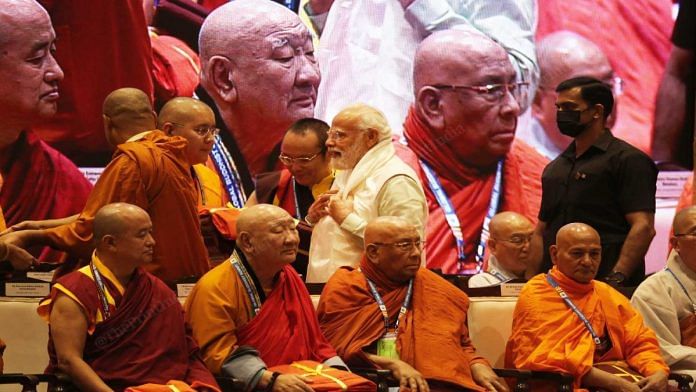New Delhi: The Global Buddhist Summit — a two-day congregation in New Delhi that concludes Friday — is a first-of-its-kind event.
Hosted by the International Buddhist Confederation in collaboration with the Indian Ministry of Culture, it saw the participation of delegates from nearly 30 countries, including Taiwan, Myanmar, Thailand, Vietnam, Sri Lanka, and Mongolia.
Monks, scholars and heads of Buddhist organisations from these countries attended the event in Delhi, but none from China — home to the world’s largest Buddhist population — was present. Sources told ThePrint that Chinese Buddhist representatives were extended invitations.
Contrary to speculation, the 14th Dalai Lama — who courted controversy over the past few days following a controversial video — attended the event Friday and gave an address emphasising the importance of Buddhist philosophy and values.
At a time when the Russia-Ukraine war continues to rage, the summit sought to find solutions to “contemporary global problems” through a Buddhist lens.
Through Buddhism, which originated in India, New Delhi shares deep cultural and historical roots with many of the countries in Asia. The government has pitched the event as a bid to “mark the significance and importance of India in Buddhism”, and a “medium to enhance cultural and diplomatic relationships with other countries”.
The Global Buddhist Summit comes at a time when India holds the presidencies of the G20 and Shanghai Cooperation Organization (SCO), and is keen to be a voice for the Global South.
Last month, India also held a first-of-its-kind conference of SCO on “Shared Buddhist Heritage”.
In his speech Thursday, PM Narendra Modi called the summit an opportunity for “like-minded and like-hearted countries” to spread Buddhism.
Speakers at the summit said it could be seen as an attempt by India to flex its soft power in the region. While it’s definitely not the first time a country has used Buddhism to this end, they added, events like the Global Buddhist Summit do offer India “political mileage”.
Also Read: G20 is India’s time under the sun. But only grand imagination, not realism, can transform it
‘Faith in Buddha’
Prime Minister Narendra Modi inaugurated the Global Buddhist Summit Thursday, where he said India had imbibed the teachings of Buddha. This, he added, was evident in its peace missions across the world, as well as its assistance in light of the February earthquake in Turkey.
He also briefly alluded to the Ukraine war.
“Two countries are at war for months, while on the other hand, the world is also going through economic instability,” he said, adding that such instability and threats of terrorism can be tackled by having faith in Buddha and the welfare of all living beings.
Speaking to ThePrint, American Buddhist author and academic Robert Thurman, who delivered the keynote address at the event, said: “You can say this event is an attempt by India to hone its soft power among its neighbours. There are many ways to analyse it.”
“But I think [on the international stage,] Modi has been sincerely saying that the main principle of India is peace and ahimsa,” he added, while also praising PM Modi’s remark to Russian President Vladimir Putin last year that “today’s is not an era of war”.
Other experts said the Global Buddhist Summit could give India “political mileage” on the world stage.
Dr Ratna Jyothi Kakumanu, a US-based doctor and a panel speaker at the summit, told ThePrint: “These kinds of forums help deepen the cultural ties between India and its neighbours. It’s also good political mileage for India. It shows our commitment to preserving the region’s Buddhist heritage.”
Professor Chandima Wijebandara, who teaches at the University of Sri Jayewardenepura in Sri Lanka — an institution born out of a Buddhist educational centre — said China and Japan had also used Buddhism as part of their diplomacy in the past.
“PM Modi was astute in his speech. He quoted directly from Buddha, specifically ‘Pariyatti’, ‘Patipatti’ and ‘Pativedha’ (Theory, Practice and Realisation),” he added. “This is sure to bode well with monks and scholars across the world.”
“But this is not new,” he said. “China and even Japan have held Buddhist conferences which can be viewed as soft power tactics.”
(Edited by Sunanda Ranjan)



